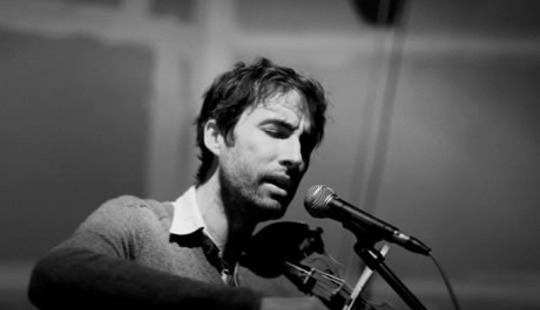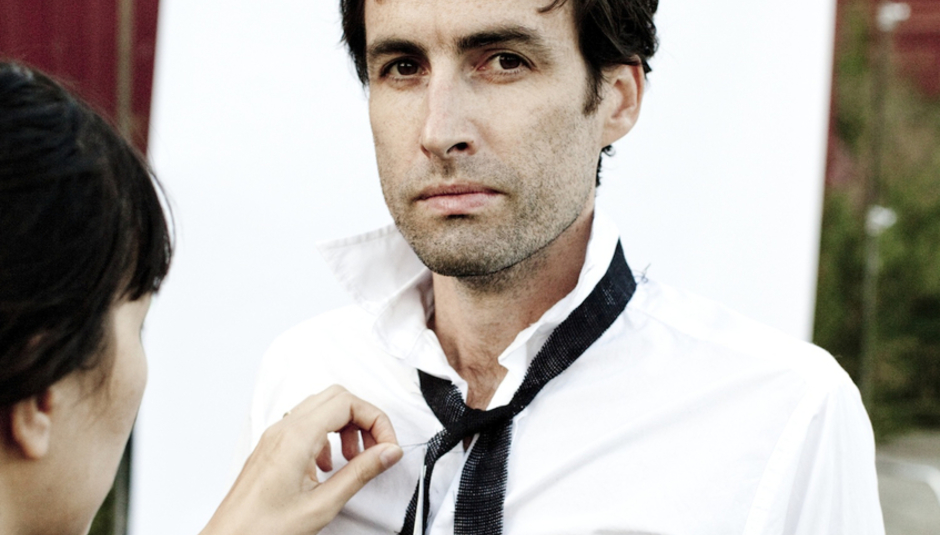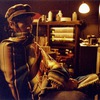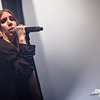“See a sea anemone, the enemy, see a sea anemone, and that’ll be the end of me.” So go the oblique opening lines to Andrew Bird’s ‘Anonanimal’. Cryptic, yes, but then nobody ever claimed him to be the most earnest songwriter in the world – not least himself.
"My songwriting is true to how I am as a person, and I am not often that direct," he admits during Fever Year, Xan Aranda's documentary centred around a 2009 show Bird and his band played at Milwaukee's Pabst Theatre. Some people display a willing volubility, while others exhibit a quiet reticence, and surely each side of this binary opposition has its virtues. Speaking to Bird on the phone during a recent trip to London, though, it strikes me that he's finding his own position on this scale of emotional readiness to be making a slow shift. He's decided, in his own words, that "autonomy is overrated."
Bird's latest record, Break It Yourself, is perhaps his most direct yet – “there are definitely lines that I would never have imagined writing four or five years ago,” he soon tells me. The dense, intricate wordplay that has previously obscured the distinction between the end of one word and the beginning of the next has taken a less prominent role, allowing the almost always novel, but often also surprisingly poignant themes and intentions behind the songs to filter through. That being said, this hallmark of his offbeat songwriting style is certainly still present: lead single 'Eyeoneye', for example, not only appears to be a made up word plucked directly from his own idiosyncratic imagination itself, but is soon also heard in discourse with the word ionise. But why the shift towards a communicativeness and vulnerability in his songwriting? I wonder if it's something to do with his personal life – a quick glance at the press release sat in front of me reveals that 'he's settled down in New York and become a father', after all. “I guess in the past I’ve felt I have to encode things a little more – and maybe I had my reasons," he explains, in a slightly arcane way, "and now just, you know, it’s a new thing, a new outlook I suppose.” But as if not to give the impression of a complete reappraisal of his style, he swiftly continues: ”I still enjoy making layers in my songs, lyrically, and having that density of layers and metaphors and what have you, and that keeps things interesting every night, to have many ways of looking at a song. And I still – even songs that get close to the bone have twists in them, you know?”
With this in mind, I sheepishly suggest a line that particularly struck me as atypical to Bird's style on listening to Break It Yourself. 'I don't see the sense in us breaking up at all', as it stands, entirely free of metaphor and wordplay, is about as 'direct' as it comes. It turns out there's a reason for this that I hadn't considered: "well that sounds very direct but I actually wrote that line for Kermit the Frog", he says, chuckling to himself. By time I've finished laughing at my oversight, Bird's scooped up the conversation and continued:
But I was aware of how it would be perceived, and I thought it finished that song well. But it’s more – I’ve always had a sort of strange relationship with pop music. I didn’t really grow up loving pop music, and I found a lot of pop songs to be repetitive, and full of clichés, and often insincere. So I would just avoid any references to hearts, or breaking hearts. And I thought: why can’t we talk about some other things, besides relationships? I mean I’ve always touched on things like that from the beginning, but it’s not a dominant theme. But hell, I mean there’s a reason why they’re clichés, right? Sometimes that’s called for. But you know, like the title of the record – it was really hard to come up with a title for it. I had a bunch of very typically poetic titles, and I was just like “I’m tired of this shit.” I just want to get to the point, you know?
The fact that Break It Yourself comes across as Bird's most forthcoming record to date also seems to be something that's intrinsically tied to the recording process. It's the first of his career to be recorded entirely at his barn just outside of Chicago – you can even hear the crickets chirping on the album's heavy-eyed coda 'Belles' – and, as far as I understand, the most open to external contribution from band mates and other musical collaborators than ever before. "I fixed up this old barn about ten years ago with the intention of bringing a band out there and recording – which I did attempt to do with Mysterious Production of Eggs,” he says, explaining the origins of the space, "but I ended up making a whole record and then scrapping it. I think it was just too much pressure, you know? Write all the songs, then perform them and produce them – then add to that, build the building that your making it in – I just kind of crumbled.” But it was far from a wasted exercise. That barn is now an important artistic retreat; one that became "a place to isolate myself, get some solitude and write, mess around with the looping stuff, and kind of just develop a new way of making music. In that sense it was hugely successful, but I could never seem to make a record there.” So then what’s changed? “I finally just – I took a little more time off after Noble Beast, took some time to myself, and kind of dealt with some... you know… life issues, and then came back to it with just a little more of a relaxed approach.”
I soon start to wonder if this recording space – the barn Bird fixed up on his family's farm – ties in any way with the photograph used as the Break It Yourself artwork – a worn, old, monochrome image of a small child pulling a toy horse across a path, away from what could well be, as it suddenly occurs to me, a barn.
My grandmother took the photo in 1915, when she was nine years old, when she was visiting her cousins in this tiny town in Missouri. And that’s her cousin, Edgar, pulling the little toy horse across the street. It was a brownie camera, so it was this little postage stamp photo in an old family photo album, and in the original you can barely see the team of horses coming around the corner behind him. I’ve always been fascinated by that photo, and I’ve since kind of studied the town, and tried to piece the story together, because Edgar does not appear in any photos after that. So it’s this mysterious, kind of ominous photograph.
The band he took to his barn to record the record, of course, was the now familiar three faces that comprise Bird's touring outfit of recent years [Martin Dosh, drums; Mike Lewis, bass; Jeremy Ylvisaker, guitar]. But what about that band? It sounds as if being able to make a record out of a more natural, free-flowing sense of collaboration is something Bird's been working towards for many years now. But does he consider it an achievement?
It’s revealing itself to me now that I’m doing a bunch of interviews about it, but it makes sense. I mean one of the themes of the record is self-sufficiency – autonomy is overrated, and it’s time to let other people in, you know? That’s a lot of what I was thinking about. I hit this point when I was touring Noble Beast, when I was touring solo through Europe, and it was just cold and dark, and there were impassive audiences, and I was really gutting myself every night, you know? Sometimes when you’re not getting it back you just give more. I just hit this total zero point, and there was this sort of clarity that came with that awful feeling at the same time, and that was kind of a turning point I think. So I took a break – I didn’t go home, because home was dark and heavy, I kind of took eight or nine months on the west coast, wrote a bunch of songs for the Muppet movie. I didn’t stop working – I joked that I was just going to play video games and smoke pot, but of course that’s not really my thing [laughs]. But that was supposed to be the idea nonetheless – just to turn my brain off for a while. So anyway, I was kind of ready to get back to why I got started on this path in the first place, just music as a social conduit, you know?
Bird's back on the road with two of his three bandmates in March, starting in London on the album's release day. Bassist/saxophonist of many years (Mike Lewis) has been globetrotting as part of the Bon Iver live band, off the back of Justin Vernon's sophomore effort under the moniker, and that's something he'll continue to do. "It’s all good. I mean I know Justin, he’s a very generous guy, so it’s fine. And the new guy I’ve got is really excellent – he also has a jazz background, it’s working fine".
 But for anyone who's seen Bird and his band live, they'll doubtless also associate the experience with the somewhat extravagant gramophone-shaped speakers of Chicago-based sculptor Ian Schneller. The sound of the double-headed horn speaker that sits behind Bird on stage, spinning to create a 'doppler effect', has even worked its way into some of his recorded output. Since he last toured extensively, Bird has collaborated more closely with Schneller, on the site-specific art installation project, the Sonic Arboretum – a 50-strong array of Schneller’s horned speakers first filled New York’s Guggenheim with Bird’s music back in 2010. The speakers will still play a significant role on the forthcoming tour, Bird soon reveals. “But we’re mixing it up this time. He’s started making these horns called the Aerosol Horns,” he explains, “they’re like a double helix kind of shape, and they spin.” Going into further detail, Bird envisages their role as part of his live show: “if this works out we’re going to hang them from the ceiling as part of the visual schematic – I don’t know if we’ll really be able to run sound through them at any point. But up until now they’ve always been functional. I mean we’ll still use the 'spinney' one, but I guess it will kind of be more of a… a vortex theme this time.”
But for anyone who's seen Bird and his band live, they'll doubtless also associate the experience with the somewhat extravagant gramophone-shaped speakers of Chicago-based sculptor Ian Schneller. The sound of the double-headed horn speaker that sits behind Bird on stage, spinning to create a 'doppler effect', has even worked its way into some of his recorded output. Since he last toured extensively, Bird has collaborated more closely with Schneller, on the site-specific art installation project, the Sonic Arboretum – a 50-strong array of Schneller’s horned speakers first filled New York’s Guggenheim with Bird’s music back in 2010. The speakers will still play a significant role on the forthcoming tour, Bird soon reveals. “But we’re mixing it up this time. He’s started making these horns called the Aerosol Horns,” he explains, “they’re like a double helix kind of shape, and they spin.” Going into further detail, Bird envisages their role as part of his live show: “if this works out we’re going to hang them from the ceiling as part of the visual schematic – I don’t know if we’ll really be able to run sound through them at any point. But up until now they’ve always been functional. I mean we’ll still use the 'spinney' one, but I guess it will kind of be more of a… a vortex theme this time.”
Taking an interesting turn into Bird's collaborators outside of his immediate band and Chicago-based artisans, we start to discuss his work with Annie Clark (perhaps better known under her stage name, St. Vincent). Their touring history together is well documented, and the fact that the two are frequent on-stage collaborators is no great secret. What Break It Yourself offers is the first recorded song from the pair. ”I think she’s developed a very singular process that’s completely her own” Bird tells me, “and she has a beautiful voice,” he says, as if so obvious a fact that the comment is redundant. “And she definitely does an excellent job of counteracting the sweetness of her voice with pretty complex music,” he adds after some further consideration. On the subject of Break it Yourself’s 'Lusitania', a gently shimmering acoustic duet full of maritime metaphor and oceanic imagery, Bird alludes to the song’s tour origins: “I mean that very performance that’s in [Fever Year] was the first time we had done it – you can sense the kind of shakiness in her voice a little bit, which is very sweet, you know?” he says, making reference to a scene from the film in which the pair rehearse the song in a hotel room. “That part of the film I think is pretty great. It’s very unscripted and honest.”
And while he talks sincerely and with great admiration about Clark and her music, he shows a relatively unbounded sense of enthusiasm when I ask about Randy Newman. I had read that, by chance, Newman ended up offering some pearls of wisdom on the new record, and as Bird recounts the time the pair spent in the studio, he is as animated as I have heard him throughout the entire conversation – his tongue-in-cheek impressions of the legendary songwriter are particularly endearing.
I was over at Mitchell Froom’s studio one day just kind of doing a little mixing, and seeing if some of Mitchell’s weird keyboards would work on a song. So Mitchell came over and said “okay if Randy comes by…” and we were kind of having a hard day and we were like [excited whisper] “oh my god, Randy Newman”, “oh, crap!” He just wanted to come by – I guess he knew my music and wanted to come by and hear a track. I guess he was kind of looking for a little something to remember how he – he said this, he was like “I’m just trying to remember how I do this shit!” You know, like “I listen to my work and it’s like, ‘how the fuck did I do that!’” So I think he’d just come off of doing some Disney score, and needed to reconnect with something, so I played him a couple of tracks and he made some painfully observant comments [laughs]. I mean they were mostly positive, it’s just that whole thing about – like that line being written for Kermit the Frog, he kind of heard that, he was like “I like the song, but it sounds like two different songs!” But you know, his style of song writing is pretty based on narrative and like ‘here’s what happened’. At least it’s like – his songs seem to be kind of sequential or something, and mine tend be more like – they all kind of point to one idea. So he kind of noticed that, that things are a little bit out of order sometimes. Nonetheless, it was cool. He’s kind of, err… he’s kind of awesome.
Andrew Bird - Break It Yourself from Mom+Pop on Vimeo.
.Break It Yourself will be released on Bella Union on March 5 2012.






















